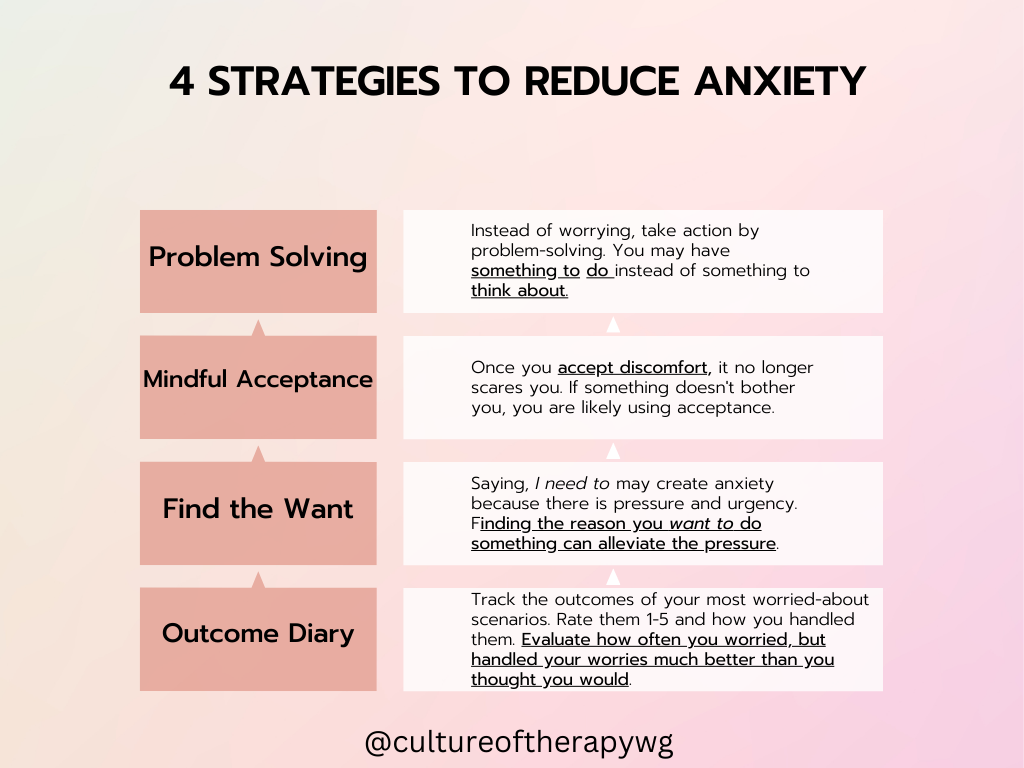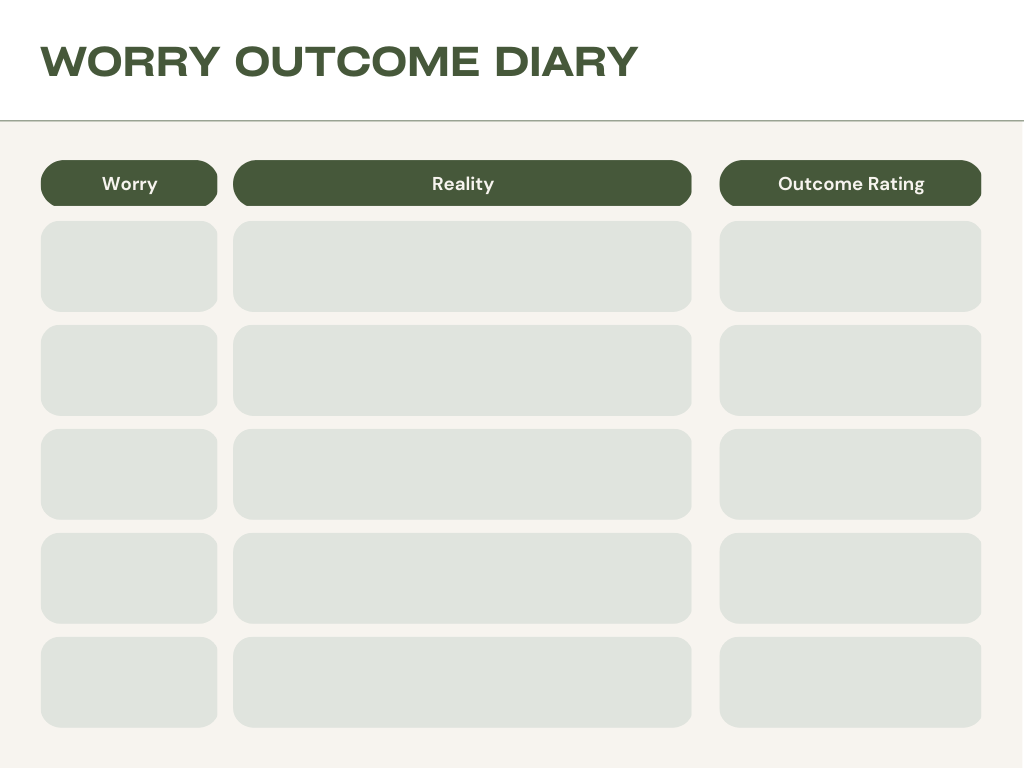4 Strategies to Reduce Your Anxiety & Optimize Your Week
Cue the end of the month anxiety! January has flown by, but it always does when we are busy moving and grooving. I hope these past three weeks have given you enough challenge, excitement, and motivation to keep you productive and aiming high. (Notice I say high and not perfect. More on this later).
But... I know aiming high doesn't come without consequence. And when I say consequence, I mean anxiety. Nagging, gnawing, hand-wringing anxiety.
I wouldn't be doing my job as a therapist if I didn't share with you some specific tools to reduce anxiety. Here are four of my most used techniques to keep you functioning optimally (my word of the year).
What thoughts and feelings come up for you as you think about resolving what makes you anxious?
Let's get to it.
Problem Solving
This one sounds basic and self-explanatory, but let me tell you why it is crucial for people who worry.
Worrying is a learned strategy. We worry because it is easier than thinking of traumatic/stressful things. We also want to prevent harm, increase the likeliness of better things happening, and feel safe. We might even be a little superstitious.
The problem with worry, is that it is useless. Worrying, as a strategy, is not going to be as effective as taking the steps to brainstorm, generate solutions, decide which are appropriate and fitting, and executing real-world action.
Think of it this way: A friend approaches you after not having any food for 10 hours and they tell you they are hungry. You tell them that you understand hunger pains and know they will not be hungry soon because you are going to worry on their behalf. What!? You would never. You would ask them when they plan to eat (to help them solve their problem). You would not accept a reality where your friend is no longer hungry just because you worried profusely.
Don't let worry distract you from finding real-world solutions to problems.
Mindful Acceptance
Avoiding anxiety (or any unpleasant sensations, thoughts, and feelings) will only increase your discomfort. Visualize a Chinese finger trap. You put your fingers into each end and try to escape. However, it is a trap! The more you fight and struggle, the more it grips you, and your discomfort increases. When you don't fight—when you give up the struggle—you are closer to the solution.
Once you accept discomfort, it no longer bothers you. If something no longer bothers you, you are likely using mindful acceptance.
Let's practice how to lean into discomfort and away from resistance. Try using process words (ending in 'ing') and not command words. Let's also add imagery to this.
Say this: 'Noticing the space that anxiety takes up in my body...what color it would be...what texture it would be if I could feel it...not changing it...just allowing it to be there...accepting it.' Visualize and repeat. Lean in.
Sometimes our resistance to discomfort causes suffering. If we practice allowing things to be as they show up in our lives, we suffer less.
The key words give anxiety permission to be there. We lean into anxiety instead of avoiding it. In turn, it bothers us less.
Worry-Outcome Diary
Track what your worry is ahead of time, what really happened, and then rate the outcome.
For worries rated '3' and above, note how you handled them.
Often times we overestimate threats and underestimate our ability to resolve them, leading to chronic worry. To reduce anxiety, practice identifying what your worry is, and rating the outcome on a scale of 1-5. For worries that turned out to be much worse than you feared, note how you handled it.
To get the most use out of this, practice with a diverse array of worries (i.e. financial, health, relationships, food, body, etc.)
In a study done of clients with Generalized Anxiety Disorder, worried-about outcomes rarely happened, but when they did, clients handled them much better than they would they would (Borkovec, Hazlett-Stevens, Diaz, 1999).
Track what your worry is ahead of time, what really happened, and then rate the outcome.
For worries rated '3' and above, note how you handled them.
Finding the Want
Sometimes telling ourselves that we need to do something creates a lot of psychological pressure, unclear timelines, and the potential for unfulfilled demands. I understand there may be things we all need to do, but a less painful way to experience life is to find the want within the need. Here is an example.
I need to clean my bathroom.
This is factually true. Nobody is going to argue with me about it, but it's not too enticing as a set up. These things sounds better and enhance motivation.
I want to take pride in my living space.
I want to minimize exposure any lingering germs and bacteria to protect my health.
I want to see my effort and hard work in a visible way.
I am more likely to take ownership, accountability, and pride in cleaning the bathroom using my own wants to get something done, rather than needs.
I hope one of these techniques is able to help ground and center you this week. But before I go....
I'd like to know. Feel free to hit reply and share with me what you do to reduce anxiety. I hope at least one of these strategies brings you some relief this week.
Next week, I will have a few special techniques for perfectionism. Stay tuned to find out more.
If you need a refresher on anything we've discussed so far about how we are setting ourselves up for the year, including how to set goals and having self-compassion for our upcoming mistakes, you can view the articles below.
If you are willing to live by the narrative that you are inherently worthy and ready for all that you want, stay tuned.
In therapy, these are the mindsets we dive into to help meet our goals. Therapy helps keep us accountable to our true selves and figure out what is most important to do in this life.
Practice Place
1. Pick one of the four strategies.
2. Practice it each day of the week.
3. Rate how the skill either increased, had no effect on, or reduced your anxiety.





